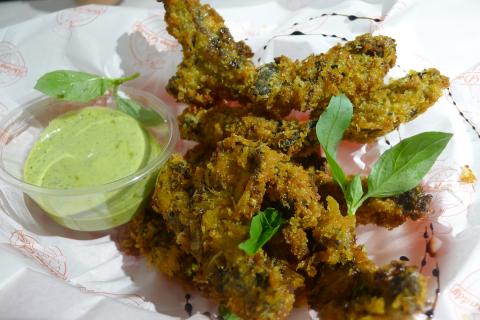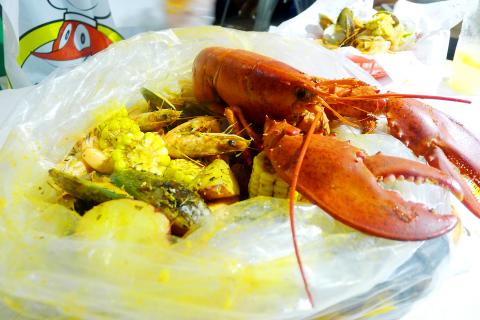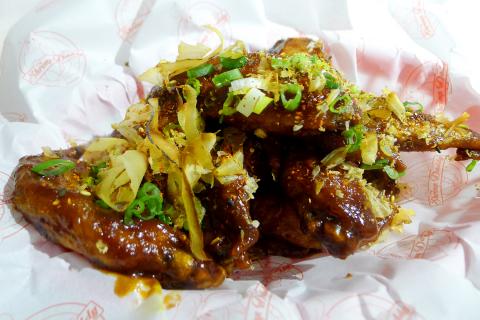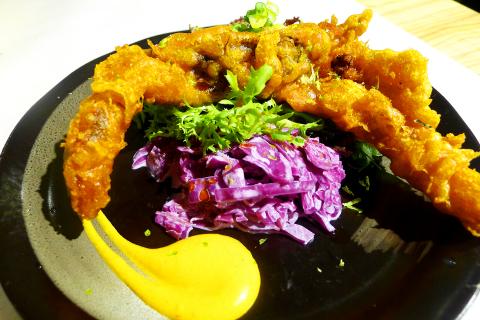Put your bibs on because there are no plates at The Shrimp Daddy — and things can get pretty messy. The recently opened bayou-style seafood restaurant offers an appealing US Deep South dining experience.
The Shrimp Daddy’s decor is clean and minimal — similar to the rustic vibe of many traditional Taiwanese seafood restaurants. Concrete floors complement white walls, and there is a stack of wooden seafood crates in one corner that will eventually adorn one of them. An oversized chalkboard displays specials along another. The tables are topped with Napkin dispensers and paper tablecloths. You don’t need much more, except an accessible sink, located at the back, since you are encouraged to eat with your hands. Plastic gloves are available if you’re worried about your manicure.
Appetizers, most of which are fried, come delivered in brightly-colored plastic baskets lined with paper. The fish (NT$250), soft-shell crab (NT$290) and fried oysters (NT$290) were particularly memorable because of the different batters, and the dipping sauces that accompanied them: basil, kaffir, and lime aioli, honey wasabi, Sriracha aioli and more. The animal-shaped fries (NT$160) came topped with large portions of caramelized onions, cheese sauce, gravy and big chunks of soft and succulent pork belly. They tasted out of this world.

Photo: Olivia Wycech
The gumbo (NT$180) is a must, but if go on a day when lobster bisque (NT$180) is on special, then opt for this rich and creamy soup. There are wings, too, and they come either in a spicy sauce or a miso/honey/togarashi blend and then sprinkled with bonito flakes (NT$230).
The heart of the meal was the southern boil (NT$1380 to NT$7088). We ordered the lobster, which was large, meaty and moist. The waiter arrived with a steaming bag of shellfish and we went to work. It’s a hands-on approach to digging, cracking, peeling and then eating a melange of crustaceans and shellfish, as well as chunks of corn on the cob, sausages and potatoes.
There are other options besides lobster to base your boil on, like Alaskan king crab or Vannamei shrimp. You can also choose your seasoning. We went with the “daddy’s shebang.” It was a little bit buttery, a little bit garlicky, with lots of Cajun zing — big clumps of creole-style herbs were studded throughout. We went easy on the spiciness, so there was almost zero firepower. I wouldn’t hesitate to try the medium or even spicy.

Photo: Olivia Wycech
One small quibble was that it lacked the kind of citrus punch I like, a problem solved with the addition of fresh lemon wedges.
I highly recommend The Shrimp Daddy to anyone except those who might have a corporate meeting afterwards. You leave smelling like the south — and very full. If you still have room, however, there is a limited selection of desserts. The Shrimp Daddy, whose mantra playfully reads Who’s YOUR Daddy, is just as much about the food as it is about the experience, and it wins on both counts.

Photo: Olivia Wycech

Photo: Olivia Wycech

Aug. 25 to Aug. 31 Although Mr. Lin (林) had been married to his Japanese wife for a decade, their union was never legally recognized — and even their daughter was officially deemed illegitimate. During the first half of Japanese rule in Taiwan, only marriages between Japanese men and Taiwanese women were valid, unless the Taiwanese husband formally joined a Japanese household. In 1920, Lin took his frustrations directly to the Ministry of Home Affairs: “Since Japan took possession of Taiwan, we have obeyed the government’s directives and committed ourselves to breaking old Qing-era customs. Yet ... our marriages remain unrecognized,

During the Metal Ages, prior to the arrival of the Dutch and Chinese, a great shift took place in indigenous material culture. Glass and agate beads, introduced after 400BC, completely replaced Taiwanese nephrite (jade) as the ornamental materials of choice, anthropologist Liu Jiun-Yu (劉俊昱) of the University of Washington wrote in a 2023 article. He added of the island’s modern indigenous peoples: “They are the descendants of prehistoric Formosans but have no nephrite-using cultures.” Moderns squint at that dynamic era of trade and cultural change through the mutually supporting lenses of later settler-colonialism and imperial power, which treated the indigenous as

An attempt to promote friendship between Japan and countries in Africa has transformed into a xenophobic row about migration after inaccurate media reports suggested the scheme would lead to a “flood of immigrants.” The controversy erupted after the Japan International Cooperation Agency, or JICA, said this month it had designated four Japanese cities as “Africa hometowns” for partner countries in Africa: Mozambique, Nigeria, Ghana and Tanzania. The program, announced at the end of an international conference on African development in Yokohama, will involve personnel exchanges and events to foster closer ties between the four regional Japanese cities — Imabari, Kisarazu, Sanjo and

By 1971, heroin and opium use among US troops fighting in Vietnam had reached epidemic proportions, with 42 percent of American servicemen saying they’d tried opioids at least once and around 20 percent claiming some level of addiction, according to the US Department of Defense. Though heroin use by US troops has been little discussed in the context of Taiwan, these and other drugs — produced in part by rogue Chinese Nationalist Party (KMT) armies then in Thailand and Myanmar — also spread to US military bases on the island, where soldiers were often stoned or high. American military policeman